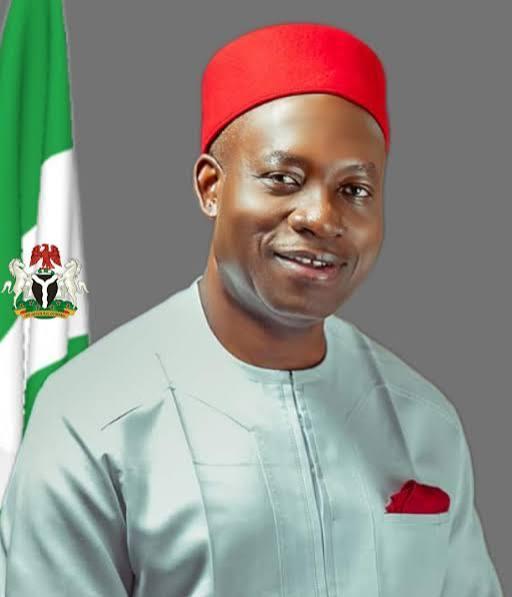Soludo to Trump: "Christians are killing Christians in the South-East".
Governor Charles Chukwuma Soludo of Anambra State has firmly rejected allegations that Christians in Nigeria’s South-East are facing a religious genocide, insisting that such claims distort the true nature of the region’s insecurity.
Speaking during a live media chat on Channels Television, Soludo said the violence is driven by deep-seated social, economic and political issues not religious persecution. His comments come on the heels of U.S. President Donald Trump’s recent accusation that the Nigerian government is enabling widespread killings of Christians, with a threat of possible military intervention to “protect” them.
Soludo dismissed the narrative, arguing that the crisis is being mischaracterized by international voices unfamiliar with the region’s realities.
“There is a deeper conversation and introspection about what goes on in the country,” he said.
“In this part of eastern Nigeria, it is not religious. People are killing themselves Christians killing Christians. The people in the bushes are Emmanuel, Peter, and John, all Christian names, and they have maimed and killed thousands of our youths. It has nothing to do with religion.”
The former Central Bank governor explained that the South-East is overwhelmingly Christian about 95 percent making it illogical to frame the killings as targeted persecution of Christians by another faith group.
“It is wider than the categorisation of Christians and Muslims,” he noted. “Nigeria will overcome, and it will end in conversation.”
While acknowledging America’s right to express concerns, Soludo emphasized that any international action must “still align with international law,” stressing that external interventions must be grounded in accurate understanding rather than sensational claims.
The governor’s remarks add to ongoing debates about the root causes of insecurity in the South-East, which many local leaders describe as a complex mix of separatist agitation, criminality and socio-economic frustration rather than religious conflict.
Governor Charles Chukwuma Soludo of Anambra State has firmly rejected allegations that Christians in Nigeria’s South-East are facing a religious genocide, insisting that such claims distort the true nature of the region’s insecurity.
Speaking during a live media chat on Channels Television, Soludo said the violence is driven by deep-seated social, economic and political issues not religious persecution. His comments come on the heels of U.S. President Donald Trump’s recent accusation that the Nigerian government is enabling widespread killings of Christians, with a threat of possible military intervention to “protect” them.
Soludo dismissed the narrative, arguing that the crisis is being mischaracterized by international voices unfamiliar with the region’s realities.
“There is a deeper conversation and introspection about what goes on in the country,” he said.
“In this part of eastern Nigeria, it is not religious. People are killing themselves Christians killing Christians. The people in the bushes are Emmanuel, Peter, and John, all Christian names, and they have maimed and killed thousands of our youths. It has nothing to do with religion.”
The former Central Bank governor explained that the South-East is overwhelmingly Christian about 95 percent making it illogical to frame the killings as targeted persecution of Christians by another faith group.
“It is wider than the categorisation of Christians and Muslims,” he noted. “Nigeria will overcome, and it will end in conversation.”
While acknowledging America’s right to express concerns, Soludo emphasized that any international action must “still align with international law,” stressing that external interventions must be grounded in accurate understanding rather than sensational claims.
The governor’s remarks add to ongoing debates about the root causes of insecurity in the South-East, which many local leaders describe as a complex mix of separatist agitation, criminality and socio-economic frustration rather than religious conflict.
Soludo to Trump: "Christians are killing Christians in the South-East".
Governor Charles Chukwuma Soludo of Anambra State has firmly rejected allegations that Christians in Nigeria’s South-East are facing a religious genocide, insisting that such claims distort the true nature of the region’s insecurity.
Speaking during a live media chat on Channels Television, Soludo said the violence is driven by deep-seated social, economic and political issues not religious persecution. His comments come on the heels of U.S. President Donald Trump’s recent accusation that the Nigerian government is enabling widespread killings of Christians, with a threat of possible military intervention to “protect” them.
Soludo dismissed the narrative, arguing that the crisis is being mischaracterized by international voices unfamiliar with the region’s realities.
“There is a deeper conversation and introspection about what goes on in the country,” he said.
“In this part of eastern Nigeria, it is not religious. People are killing themselves Christians killing Christians. The people in the bushes are Emmanuel, Peter, and John, all Christian names, and they have maimed and killed thousands of our youths. It has nothing to do with religion.”
The former Central Bank governor explained that the South-East is overwhelmingly Christian about 95 percent making it illogical to frame the killings as targeted persecution of Christians by another faith group.
“It is wider than the categorisation of Christians and Muslims,” he noted. “Nigeria will overcome, and it will end in conversation.”
While acknowledging America’s right to express concerns, Soludo emphasized that any international action must “still align with international law,” stressing that external interventions must be grounded in accurate understanding rather than sensational claims.
The governor’s remarks add to ongoing debates about the root causes of insecurity in the South-East, which many local leaders describe as a complex mix of separatist agitation, criminality and socio-economic frustration rather than religious conflict.
0 Comments
·0 Shares
·554 Views




